【译林版】八年级英语上册:Unit 8 Natural disasters Revision教案
牛津译林版八年级上册英语Unit 8 语法讲解和练习-(含答案)
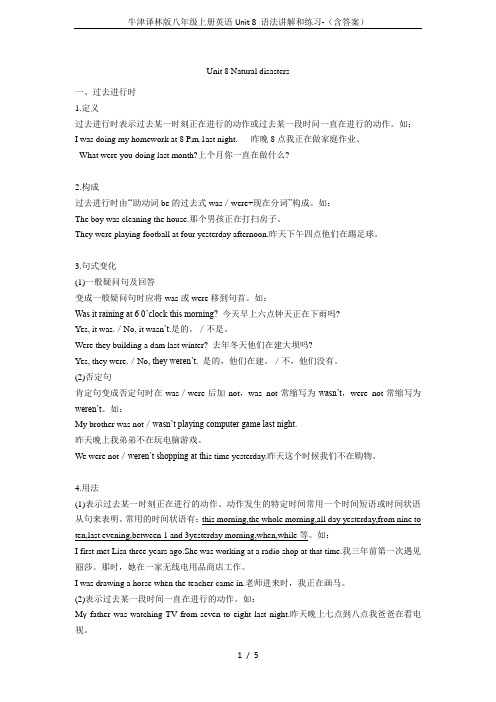
Unit 8 Natural disasters一、过去进行时1.定义过去进行时表示过去某一时刻正在进行的动作或过去某一段时问一直在进行的动作。
如:I was doing my homework at 8 P.m.1ast night. 昨晚8点我正在做家庭作业。
What were you doing last month?上个月你一直在做什么?2.构成过去进行时由‘‘助动词be的过去式was/were+现在分词”构成。
如:The boy was cleaning the house.那个男孩正在打扫房子。
They were playing football at four yesterday afternoon.昨天下午四点他们在踢足球。
3.句式变化(1)一般疑问句及回答变成一般疑问句时应将was或were移到句首。
如:Was it raining at 6 0’clock this morning? 今天早上六点钟天正在下雨吗?Yes, it was./No, it wasn’t.是的。
/不是。
Were they building a dam last winter? 去年冬天他们在建大坝吗?Yes, they were./No, they weren’t. 是的,他们在建。
/不,他们没有。
(2)否定句肯定句变成否定句时在was/were后加not,was not常缩写为wasn’t,were not常缩写为weren’t。
如:My brother was not/wasn’t playing computer game last night.昨天晚上我弟弟不在玩电脑游戏。
We were not/weren’t shopping at th is time yesterday.昨天这个时候我们不在购物。
4.用法(1)表示过去某一时刻正在进行的动作。
动作发生的特定时间常用一个时间短语或时间状语从句来表明。
译林版初中英语八年级上册Unit8Natural disasters知识点归纳及巩固练习题、参考答案

译林版牛津初中英语八年级上册Unit8Natural disasters知识点归纳及巩固练习题1. disaster n. 灾难;不幸,祸患natural disasters 自然灾害2. mop vt. 用拖把擦干净(mopped mopping)up adv 完全地mop up / eat up /clean up /use upmop up 拖干,把......拖干(mop it /them up)eg. Hobo wants Eddie to mop up all the water. earthquake n. 地震an earthquake in the earthquake eg. There was an earthquake in Sichuan in 2008.4. 1)thousands of 成千上万的/hundreds of 成百上千的/ millions of 成百万的+名词复数eg. Thousands of people lost their lives in the earthquake.There are thousands of people on the road.2)数词+hundred/thousand/million+名词复数There are three thousand students in our school.5. accident n. 事故,意外的事eg. There was a car accident yesterday.昨天有一场交通事故。
A car accident killed three men three days ago.Three men lost their lives in the car accident three days ago. 在三天前的一场交通事故中三人丧生。
6. coach n. 长途汽车(coaches) get on/off the coachIt took us three hours to go to Nanjing by coach. .7. crash vi. & vt. 猛撞;碰撞crash into 猛撞,碰撞eg. A car crashed into a tree last night. 昨天晚上一辆车猛撞到一棵树上。
牛津译林版英语八上Unit8NaturalDisasters
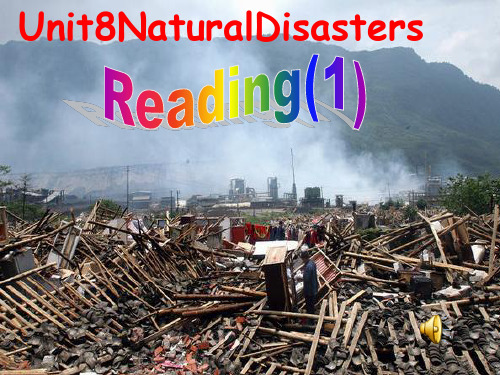
•
惊恐地尖叫 向四面八方逃离 感到一阵轻微的摇晃 片片玻璃和砖块 我被困了。 平静下来 大喊救命 活着 寻找出路 黑暗中拽着自己 缓慢爬行 搬走砖块
Post-reading
WhatdoyouknowaboutTimmy’sstoryinTaiwanearthq uake? WhentheearthquakehitTaiwanin1999,Timmywas___ sleeping _____.Heheardaloudnoiselike________.Thenthenoi thunder sebecamelouder,likebombsundertheground.Peoplesc reamedin________.Thenpiecesofglassand_______ bricks fear ___felldown. Whenthenoiseandshakingstopped,Timmywas______ __andcouldnotgetout.Hefelt_________andhisheart trapped was__________.Amomentoffearwentthroughhis__ nervous beating ___.Thenhetriedto____downand_________himself mind slowlythroughthedark.Finally,peoplecameandheardhi calm pulled scryforhelp.Theymovedawaythebricksand____him. Timmywas______atlast.
F 2.Hefeltnervousandhishead
wasbeatingfast.
heart
mind
牛津译林版初二英语八年级上册8A Unit 8 Natural disasters课件

The earthquake hit Yangzhou last summer
Mr Ding’s story
I was sick in hospital last summer. I was lying in bed when earthquake happened, my wife was looking after me, my daughter was watching TV at home with her grandparents. At that time I felt a slight shake, I heard the people outside scream in fear. I saw the people in the street run in all directions through the window. At first I was very nervous , my heart was beating fast . But after a short while, I found everything was OK. I’m not afraid at all, my wife asked me to calm down, because we are still alive, we are safe.
Ⅱ Pre-reading 2
Background of Taiwan Earthquake
There was an earthquake in Taiwan. It happened on 21st September 1999. 12,000 buildings fell down . 1,700 people died. Timmy survived the earthquake. He wrote his story and put it on his home page.
牛津译林版八年级英语上册unit8naturaldisasterswelcometotheunit

Complete the following sentences. 1. 1998年的特大洪水冲走了许多房屋和 大树。 washed a lot of The big flood in 1998 ______________ houses and trees away. ________________________________ 2. 在唐山大地震中,成千上万人遇难。 killed The Tangshan Earthquake _________ thousands of people. ________________________________
a big fire
cause
flood
typhoon台风
accident事故
earthquake地震
Natural disasters are caused by natural forces.
accident
事故
A car crashedinto a tree.
撞上
Accidents are caused by people.
Unit8 Natural disasters
Comic strip & Welcome to the unit
Free talk
snow
snowstorm
wind
typhoon
[tai'fu:n]
rain
rainstorm ' [reinstɔ:m]
thunder and lightning ['θʌndə]
1.What can we do to reduce(减少) natural disasters? 2. What can we do to help the people in disaster areas(灾区)? 3. How can we protect ourselves from accidents?
牛津译林初中八年级英语上册 Unit 8 Natural disasters reading 2课件

▪ start to shake
shake one’s head
v.
shake down the apples
shake v.& n.
shaking n.
shook
1) At first, the slight __s_h_a__k_e_/_s_h_a__k_in_gof the house made Timmy frightened.
11. … I told myself to calm down …(line12) calm down 冷静下来,平静下来
calm v. 使平静,使镇静 n. 平静,宁静 adj. 平静的,镇静的
e.g. Just calm down a bit! 你先静一静!
Can you translate the following sentences?
e.g. People screamed in fear. 人们害怕地尖叫起来。
e.g. They got lost in the forest. They had to try different ways in fear. 他们在森林里迷路了,他们不得不害 怕地尝试不同的路。
5. Some ran out of the building. (line5) run out of … 从……跑出 e.g. Some students run out of the classroom.
Fill in the blanks with the correct words or phrases:
shake fall down scream in fear in all directions
try one’s best to protect calm down
[译林版][初二上英语unit8]第一讲Natural disasters(学生篇)
![[译林版][初二上英语unit8]第一讲Natural disasters(学生篇)](https://img.taocdn.com/s3/m/dc84e9e02cc58bd63086bd16.png)
1第1讲Natural disasters1.识记单词、常考短语、经典句型。
2.掌握本单元部分重点知识点的用法。
3.了解自然灾害和事故的表示。
灾难;不行,祸患n. disaster 用拖把擦干净vt .mop 完全地adv. up地震n. earthquake 成千上万的 thousands of 事故,意外的事n.accident 长途汽车n. coach 猛撞;碰撞 vi&vt crash 洪水,水灾n.flood 冲走wash away 村庄,乡村 n. village 闪电 n. lightning 风暴n. storm 雷,雷声n. thunder 着火catch fire 轻微的 adj. Slight 摇动,震动 n. shake 响亮 adj. loud 炸弹n. bomb 摇动,震动 vi&vt. shake 害怕,恐惧n.fear 方向n. direction 四面八方in all directions 当…的时候,和…同时 conj .while砖,砖块n. brick 崩塌come down 摇动n. shaking 寂静的adj silent 一点也不not...at all 是否 conj. if紧张不安的 adj nervous 心脏n. heart 规律作响vi&vt. beat 困住的adj trapped 头脑n. mind (使)平静vi&vt. calm 冷静calm down 由于,既然c onj. since 仍然adv. still 活着的adj. alive 黑暗n. dark 找到出路find one’s way out 呼喊,喊叫声n. shout 最后,终于a t last 日光 n. daylight安全的adj safe 睡着的adj. asleep 在…以后conj. after损坏;打破 vi break 出故障,坏掉break down因为,由于because of …尽可能…as...as possible 毛巾,浴巾n. towel 规则n. rule 铁路n. railway 烧伤,烫伤,灼伤n. burn 女儿n. daughter (外)孙女n. granddaughter 儿子n. son (外)孙子n.grandson 木板n. board工作日(星期一至星期五的的任一天) n.weekday 头痛n.headache 牙痛n.toothache 乡下,农村n.countryside 家务活n. housework 烙饼,薄饼 n.pancake 几乎,将近adv. nearly 清除,清理vt. clear 在后面adv behind二.重点短语1.wash away 冲走wash 代词away2.be all wet 全湿了3.start to rain 开始下雨4.wake up 醒来wake代词up wake up+名词5.mop up the water 把水拖干净26.crash into a tree 撞在树上7.start big fire 引起大火8.fall from the tree 从树上掉下来9.a heavy storm with thunder and lightening 伴有雷电的大暴雨10.catch fire 着火11.in the early morning 在清晨12.feel a slight shake 感觉到轻微的晃动13.hear a loud noise like thunder 听到像雷声的噪音14.start to shake 开始摇晃shake hands with sb.15.scream in fear 恐惧地尖叫16.run out of the building 跑出楼房17.try my best to run out 尽我所能的跑出18.begin to calm down 开始平静下来19.say to oneself 自言自语20.calm down 平静下来21.silent silence silently 安静寂静的22.not at all 一点也不23 find one’s way out 找到出路24.hear about the fire 听说火灾hear of 听说hear from收到...的来信25. Was anyone hurt? 有没有受伤?hurt v.adj.26. fear v. fearful fearless 害怕A moment of fear went through my mind. 一丝恐惧掠过我的脑海。
牛津译林版八年级上Unit 8 Natural disasters
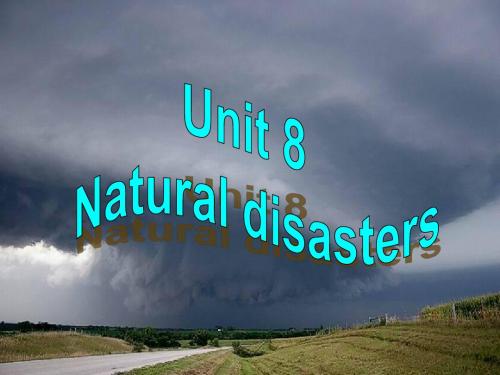
you / were. we / they he / she was. / it
No,
you / we weren’t. / they he / she wasn’t. / it
A snowstorm hit Sunshine Town. Mr. Wu is asking the students about it.
was (not) were (not)
was (not) sleeping at 10 p.m. last night.
Was
I
Were
Was
you / we / they
he / she / it
at 10 p.m. sleeping last night?
I
was.
I
wasn’t.
Yes,
I was playing computer games
at that time. She was reading newspaper from 10
to 11 yesterday morning.
Past continuous tense
be (was/were) + verb-ing
1. 过去进行时主要表示在过去某一时刻正 在进行的动作。 e.g. a) They were eating breakfast at 7:00 am yesterday. b) I was writing a letter at this time yesterday. c) Five minutes ago, Danny was looking out of the window and Suzy was reading a book.
past.
牛津译林版八年级上册Unit 8《Natural disasters》(Task)说课稿
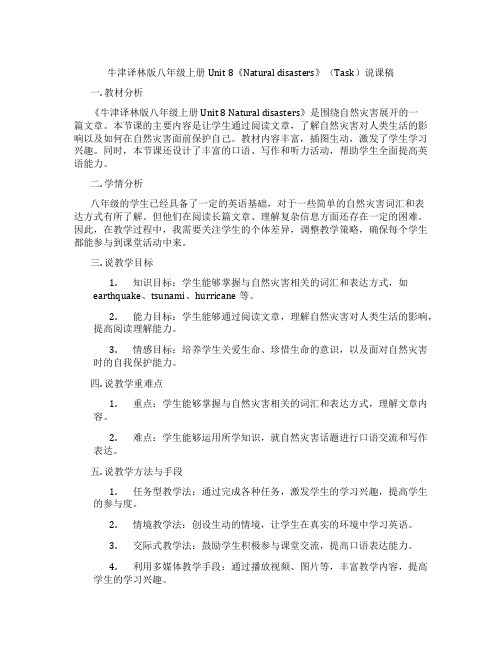
牛津译林版八年级上册Unit 8《Natural disasters》(Task)说课稿一. 教材分析《牛津译林版八年级上册Unit 8 Natural disasters》是围绕自然灾害展开的一篇文章。
本节课的主要内容是让学生通过阅读文章,了解自然灾害对人类生活的影响以及如何在自然灾害面前保护自己。
教材内容丰富,插图生动,激发了学生学习兴趣。
同时,本节课还设计了丰富的口语、写作和听力活动,帮助学生全面提高英语能力。
二. 学情分析八年级的学生已经具备了一定的英语基础,对于一些简单的自然灾害词汇和表达方式有所了解。
但他们在阅读长篇文章、理解复杂信息方面还存在一定的困难。
因此,在教学过程中,我需要关注学生的个体差异,调整教学策略,确保每个学生都能参与到课堂活动中来。
三. 说教学目标1.知识目标:学生能够掌握与自然灾害相关的词汇和表达方式,如earthquake、tsunami、hurricane等。
2.能力目标:学生能够通过阅读文章,理解自然灾害对人类生活的影响,提高阅读理解能力。
3.情感目标:培养学生关爱生命、珍惜生命的意识,以及面对自然灾害时的自我保护能力。
四. 说教学重难点1.重点:学生能够掌握与自然灾害相关的词汇和表达方式,理解文章内容。
2.难点:学生能够运用所学知识,就自然灾害话题进行口语交流和写作表达。
五. 说教学方法与手段1.任务型教学法:通过完成各种任务,激发学生的学习兴趣,提高学生的参与度。
2.情境教学法:创设生动的情境,让学生在真实的环境中学习英语。
3.交际式教学法:鼓励学生积极参与课堂交流,提高口语表达能力。
4.利用多媒体教学手段:通过播放视频、图片等,丰富教学内容,提高学生的学习兴趣。
六. 说教学过程1.导入:以一段关于自然灾害的视频导入,激发学生的学习兴趣。
2.阅读理解:学生阅读文章,回答相关问题,了解自然灾害对人类生活的影响。
3.词汇学习:学生通过小组合作,归纳总结文章中出现的自然灾害词汇。
牛津译林版八年级英语上册unit8naturaldisasterstask

今天早晨人们努力工作来除去(remove)路 上的积雪。
_T_h_is_m_o_rn_in_g_p_eo_p_le_w_e_re_w_o_r_ki_ng_h_a_rd___________ _to_r_e_m_ov_e_the snow.
我们的家乡真美啊! _H_o_w_b_e_au_t_ifu_l_ou_r_h_o_m_et_ow_n_i_s!_______________
after the snowstorm
Choose a topic(话题)
What to write about
Introduction(介绍)
During the disaster
After the dn and where
I saw… I heard… I felt… … I saw… I heard… …
After the snowstorm, many people were working hard to clear the snow.
Introduction Where did it happen? Beijing When did it happen? on Friday,5 January
走。 2. 天变得很黑,公路上发生了车祸。 3. 驾驶员的左腿严重受伤,幸运的是,有人打了110求救。 4. 警察把他送到医院,驾驶员变得好多了。 5. 遇到麻烦时,首先,我们必须冷静……
习作评价标准
分值
构思(2’) 内容(5’) 语言(4’)
其它(4’)
正确地叙事,时间顺序清楚。
结构合理、要点齐全、意思连贯。
Where were you? in the classroom
During the What did you do? share … with snowstorm What happened? lose my umbrella
牛津译林版八年级上册Unit 8《Natural disasters》(Task)教学设计

牛津译林版八年级上册Unit 8《Natural disasters》(Task)教学设计一. 教材分析牛津译林版八年级上册Unit 8《Natural disasters》主要介绍了自然灾害,包括地震、洪水、台风等,通过学习本单元,学生可以掌握有关自然灾害的词汇和表达方式,了解自然灾害发生的原因及应对措施。
Task部分要求学生阅读一篇关于自然灾害的文章,然后进行相关练习,培养学生的阅读能力和解决问题的能力。
二. 学情分析八年级的学生已经具备了一定的英语基础,能够进行简单的阅读和交流。
但部分学生在阅读长篇文章时,可能会遇到生词和语法难题,影响阅读理解。
此外,学生对于自然灾害的了解程度不一,需要教师在教学中进行引导和补充。
三. 教学目标1.知识目标:学生能够掌握有关自然灾害的词汇和表达方式,了解自然灾害发生的原因及应对措施。
2.能力目标:学生能够阅读并理解关于自然灾害的文章,提高阅读能力;通过任务型教学,培养学生的解决问题能力。
3.情感目标:培养学生关爱生命,关注自然的意识,提高学生应对自然灾害的能力。
四. 教学重难点1.重点:学生能够掌握有关自然灾害的词汇和表达方式,阅读并理解关于自然灾害的文章。
2.难点:学生能够运用所学知识,解决实际问题,提高应对自然灾害的能力。
五. 教学方法1.任务型教学法:通过任务型教学,让学生在实践中掌握知识,提高能力。
2.情境教学法:创设情境,让学生在真实的环境中学习,提高学生的学习兴趣。
3.合作学习法:引导学生进行小组合作,培养学生的团队精神和沟通能力。
六. 教学准备1.教师准备:提前准备关于自然灾害的文章,整理相关词汇和表达方式,设计任务型练习。
2.学生准备:预习课文,了解自然灾害的基本知识,准备参与课堂活动。
七. 教学过程1.导入(5分钟)教师通过提问方式引导学生谈论自然灾害,激发学生的学习兴趣。
例如:“你们知道哪些自然灾害?它们发生的原因是什么?”2.呈现(10分钟)教师呈现关于自然灾害的文章,让学生快速阅读,了解文章大意。
新牛津译林版八年级英语上册 Unit 8 Natural disasters

Unit 8 Reading【Analysis of teaching material】The Two reading paragraphs are excerpted from Robinson Crusoe which is written by Daniel Defoe and introduces Robinson’s youth and the time up to his shipwreck, his 28 years on an uninhabited island,his life and adventures after being rescued from the island.The first paragraph is about Robinson’s life and inner his feeling after he first arrived on the island, and the second paragraph mainly talks about the story between Robinson and Friday.【Teaching aims】1.Students master some key words and phrases.2.Students can improve their reading skills of scanning and skimming.3.Students can understand the present perfect tense in the passage4.Students can have awareness of never giving up in the face of difficulties.【Teaching key and difficult points】1.To improve students’ reading skills of skimming and scanning.2.To understand the present perfect tense in the passage.【Teaching method】3P【Teaching procedures】Step1: Lead-in1.Daily greeting to students.2.Check the homework3.Watch a short video and imagine what you will do if you are left alone on theisland? Wait for death or find ways to survive?4.What would you prepare to deal with the problems?Step2: Pre-readingLook at the picture, what can you know from the picture?Step3: Fast-readingRead and match the main idea with each paragraphStep 3: Careful reading1.Imagine what problems you may have if you were left alone on the island just like Robinson?2.Read para.1 and find what Robinson has done to deal with the problems?3.Read Para. 2 and complete the timelineStep 4: After reading1.What do you think of Robinson Crusoe?Robonsin is brave, creative, clever, optimistic and he is a ma full of wisdom and courage.2.What can we learn from Robinson Crusoe?●Never give up trying in the face of difficulties.●There are more ways than difficulties.●Learn the importance of life skillsLife is fine, and learn to enjoy it.3.Is there anyone who has the same spirit as Robinson?4.Robinson and Friday lived on the island for 28 years. Finally, they were saved by a ship passing by. Can you make up your end to the story?【Homework】Level 1:Tell the story of Robinson Crusoe to your friends after class.Level 2: Try to go on writing your own story of Robinson and share your story with us next class.【Blackboard design 】【Teaching reflection】In this reading class,individual learning and group cooperation are combined to promote to improve students’ reading skills, and in some ways stimulate learning motivation of students. However, as the reading passages in grade 8 are becoming more and more difficult,some students still don’t have the habit of previewing, so they can’t finish the reading tasks within limited time. Besides, some students are not able to understand the present perfect tense in the passage. Last but not least, the text analysis is not enough.。
牛津译林版八年级英语上册专题+Unit8+Natural+disasters-讲义
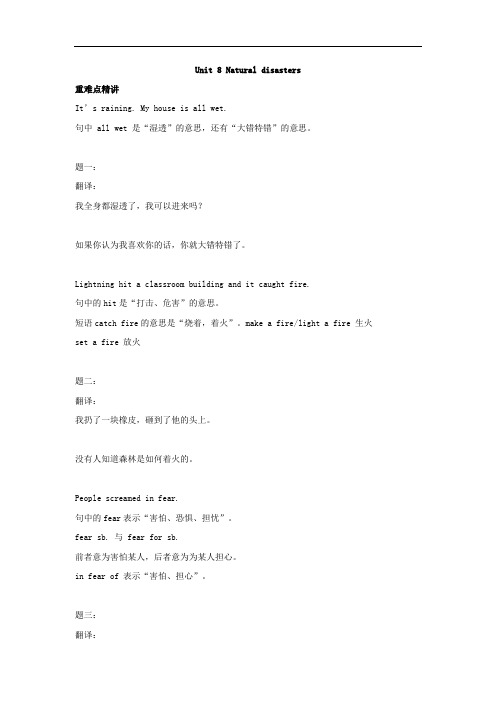
Unit 8 Natural disasters重难点精讲It’s raining. My house is all wet.句中 all wet 是“湿透”的意思,还有“大错特错”的意思。
题一:翻译:我全身都湿透了,我可以进来吗?如果你认为我喜欢你的话,你就大错特错了。
Lightning hit a classroom building and it caught fire.句中的hit是“打击、危害”的意思。
短语catch fire的意思是“烧着,着火”。
make a fire/light a fire 生火set a fire 放火题二:翻译:我扔了一块橡皮,砸到了他的头上。
没有人知道森林是如何着火的。
People screamed in fear.句中的fear表示“害怕、恐惧、担忧”。
fear sb. 与 fear for sb.前者意为害怕某人,后者意为为某人担心。
in fear of 表示“害怕、担心”。
题三:翻译:他怕他老婆。
他为他老婆担心。
我们担心会再下雪。
Outside, people were running in all directions while pieces of glass and bricks were falling down.句中的while是一个连词,连接两个并列句,表示“对比”关系。
in all directions 四面八方题四:翻译:我喜欢唱歌,而她喜欢跳舞。
他出去散步了,而我却呆在家里。
学生们从四面八方地跑进了教室。
A moment of fear went through my mind, but I told myself to calm down since I was still alive.句中的fear是______,是“______”的意思。
go through有“通过、检查”的意思。
calm down, relax, cool down题五:翻译:你现在害怕回到你自己的国家吗?他正处于非常艰难的时期。
最新【牛津译林版】八年级英语上册:Unit 8 Natural disasters Reading

Fourth reading
While-reading
Timmy’s different feelings in different time
How did Timmy feel?
◆I tried my best to run out too, but I could not. (Line 5) ◆I felt nervous and my heart was beating fast. (Line 11) ◆“I’m trapped,” I said to myself. (Line 11) ◆A moment of fear went through my mind, but I told
making no or little sound
Pocket dictionary
Pre-reading
◆slight adj. 轻微的 ◆shake nv..摇摇动动
◆bomb n. 炸弹
◆fear n. 恐惧
◆direction n. 方向 ◆brick n. 砖块
Who saved Timmy? ◆silent adj. 寂静的 ◆nervous adj. 紧张的
•
16、业余生活要有意义,不要越轨。2021/5/102021/5/10May 10, 2021
•
17、一个人即使已登上顶峰,也仍要 自强不 息。2021/5/102021/5/102021/5/102021/5/10
Key expressions
shake scream direction come down silent be trapped calm down at last safe
myself to calm down since I was still alive. (Line 12) ◆I shouted for help, but no one came. (Line 14) ◆I screamed, “Help! Please help! I’m here!” (Line 18) ◆At last, I saw the bright daylight. I was safe. (Line 20)
牛津译林版八年级英语上册:Unit 8 Natural disasters
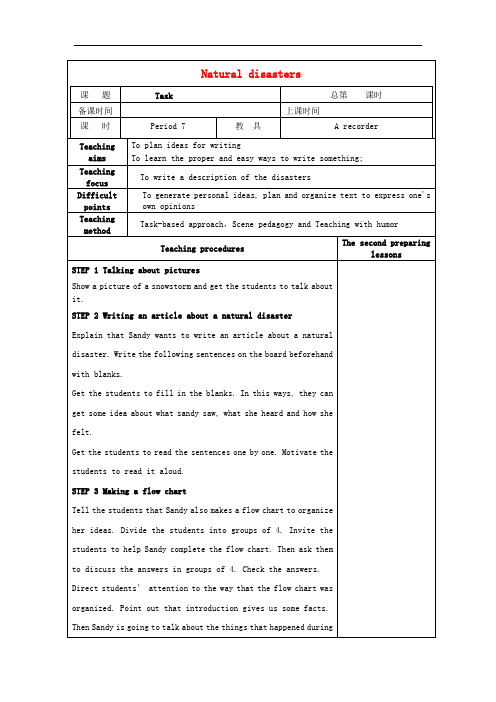
Get the students to read the sentences one by one. Motivate the students to read it aloud.
STEP 2 Writing an article about a natural disaster
Explain that Sandy wants to write an article about a natural disaster. Write the following sentences on the board beforehand with blanks.
To write a description of the disasters
Difficult points
To generate personal ideas, plan and organize text to express one's own opinions
Teaching method
STEP 5Homework
a.Read the sample article once again and try to understand its structure.
b.Write about a disaster
Teaching notes
Natural disasters
课题
Task
总第课时
备课时间
Unit8Naturaldisasters知识复习牛津译林版八年级英语上册
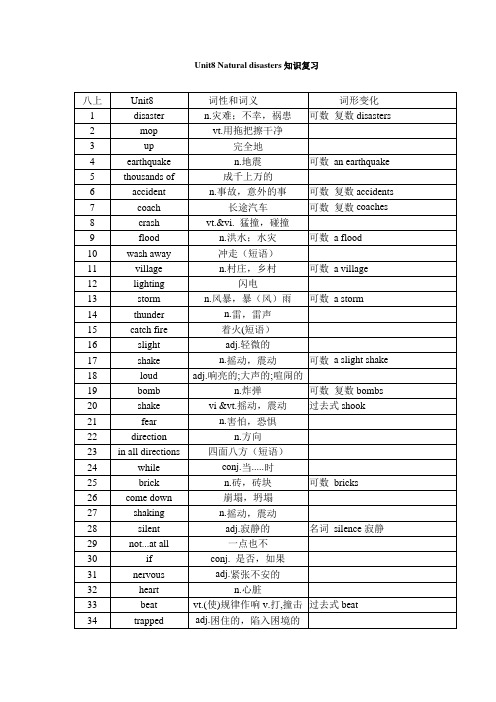
Unit8 Natural disasters知识复习巩固练习一.单项选择()1.The floor is quite wet. My teacher asked us quickly.A.mop up itB.mopped it upC.to mop it upD.to mop up it()2.—What should I do when the earthquake happens, Dad?—First of all, it’s important to and hide yourself in the corners of the room.A.calm downB.put downC.get downD.fall down()3.—did the accident happen?—While we a Chinese lesson yesterday.A.When; have hadB.While; are havingC.When; were havingD.While; have()4.—What happened your uncle?—His car crashed a tree on his way back home yesterday evening.A.to; toB.with; toC.to; intoD.of; under()5.I was writing a diary my brother was watching TV yesterday evening.A.beforeB.afterC.untilD.while()6.—Uncle Wang, I dropped by your home at 6:00 p.m. yesterday, but nobody was in.—Oh, I a meeting.A.was havingB.am havingC.will haveD.have had()7.He felt so that he fell soon.A.sleepy; asleepB.asleep; sleepyC.sleeping; asleepD.sleepy; sleepy()8. wonderful The Reader is! Many people enjoy the TV programme.A.WhatB.How aC.HowD.What a()9.—The picture of the Snowflake Boy was very popular in 2018.—Yeah, it received Internet hits.A.thousands ofB.thousandC.hundredD.hundreds()10.You’ll get better grades you follow the teachers’ advice.A.ifB.untilC.thoughD.while()11.While Xiao Ming his homework, his mother came with a cup of tea.A.has doingB.has doneC.is doingD.was doing()12.As I to take photos of the little cat, suddenly a big snowball me.A.was trying; was hittingB.tried; was hittingC.was trying; hitD.was tried; hit()13.This washing machine . It needs to be repaired.A.worked wellB.broke downC.ran upD.went on()14.According to a recent survey, three-fifths of working mothers in China don’t want to hav e a second child.A.mostlyB.especiallyC.partlyD.nearly()15.His grandfather did his best to keep the tree but it died in the end.A.aliveB.asleepC.absentD.awake( )16. We were walking slowly when a strong blew from behind.A. windB. cloudC. stormD. snow( )17. There are some bricks on the road. Let’s them, or there may be traffic accidents.A. carryB. clearC. catchD. fix( )18. I was working hard on the problem when a wonderful idea suddenly went____ my mind.A. inB. overC. acrossD. through( )19. At the beginning of the exam, it was hard for me to calm down. I could feel my heartfast.A. shakingB. beatingC. jumpingD. running( )20. — Were you when you were playing in the final?— Not at all. I was quite sure that our team would win.A. excitedB. interestedC. calmD. nervous( )21. — Which of the following words is NOT a compound word?—is.A. ToothacheB. CarelessC. RailwayD. Rainstorm( )22. An earthquake happened in Ya’an Sichuan in April 2013. peoplelost their houses in it.A. ThousandsB. Thousand ofC. Thousands ofD. Thousand( )23. — Do you know if it tomorrow?— I am not sure. It may snow if the temperature below zero.A. snows; will dropB. will snow; will dropC. will snow; dropsD. snows; drops( )24. Tom didn’t hear the car because he ________ music through headphone.A. listened toB. was listening toC. was listen toD. is listening to( )25. The boy was running towards his mother _________ he suddenly fell over.A. afterB. whileC. whenD. as( )26. A football me when I past the football field. My arm still hurts now.A. hit; was walkingB. was hitting; was walkingC. was hitting; walkedD. hit; am walking( )27. — We plan to drive our car to Dalian next month.— Are you joking? What if it ?A. breaks awayB. breaks downC. breaks upD. breaks off( )28. from the smoke, you should stay low to the ground while running out of a burning house.A. To keeping awayB. To keep awayC. Keep awayD. Keeping away( )29. As Tom is a brave boy, he knows how to stay calm when there is danger.Which word can replace (代替) “As” here?A. SoB. SinceC. UntilD. If( )30. — A typhoon called Usagi (天兔) hit Guanddong Province and it killed 30 people.— ________________It was really a terrible disaster.A. They were too careless.B. Thank goodness!C. Never mind.D. I am sorry to hear that.( )31. —Linda, I called you this morning, but nobody answered the phone.—I’m sorry. I ______ football with my friends then.A. playB. playedC. am playingD. was playing( )32. The birds flew away ______every direction as soon as they found themselves ______.A. in; in dangerB. to;dangerousC. to;in dangerD. in; dangerous( )33. If you ______,I’ll ______ by myself.A. don’t come; mop up itB. won’t come; mop it upC. don’t come; mop it upD. won’t come; mop up it( )34. Mr Su was driving in the snowstorm ______his car crashed into a tree.A. whenB. asC. whileD. as soon as( )35. —I’m sorry I ______m y exercise book at home.—Don’t forget______ it to school tomorrow, please.A. forgot;to takeB. left;to bringC. forgot; to bringD. left;to take( )36. —I’m really ______before the competition.—Take it easy. Sure you are the best.A. coolB. seriousC. nervousD. patient( )37, The earthquake ______when I ______some cleaning,A. starts;was doingB. started; was doingC. was starting; was doingD. starts; were doing( )38. —My brother hurt his legs when he rode his bike on the way back home. —______.A. That’s too badB. He is very carelessC. Be careful next timeD. Tm sorry to hear that( )39. The government of Linyi is building _____cheap and good houses for the people.A. thousandB. thousandsC. thousand ofD. thousands of( )40. —______will the film begin? —_______ half past seven.A. How long;Not untilB. How soon;UntilC. How long;UntilD. How soon;Not until二.完成句子1.蝴蝶朝四面八方飞去。
- 1、下载文档前请自行甄别文档内容的完整性,平台不提供额外的编辑、内容补充、找答案等附加服务。
- 2、"仅部分预览"的文档,不可在线预览部分如存在完整性等问题,可反馈申请退款(可完整预览的文档不适用该条件!)。
- 3、如文档侵犯您的权益,请联系客服反馈,我们会尽快为您处理(人工客服工作时间:9:00-18:30)。
Natural disasters
课题Revision 总第课时
备课时间上课时间
课时Period 8 教具 A recorder
Teaching
aims
to review what they have learnt in this unit;
Teaching
focus
To revise the use of past continuous tense
Difficult
points
To identify the vocabulary about bad weather and natural disasters
Teaching
method
Task-based approach,Scene pedagogy and Teaching with humor
Teaching procedures The second preparing
lessons
STEP 1 Giving a weather report
Get a student give a weather report. Then get them to talk about their favorite weather.
STEP 2 Eliciting the use of past continuous tense
Remind the students of the topic of this unit ‘Natural Disaster’.
Elicit the use of past continuous tense. By asking some questions.
What was Timmy doing when the earthquake happened?
He was doing some shopping when the earthquake happened. While/ when he was doing some shopping the earthquake. While / he was doing some shopping, his mother was cooking at home.
Explain the way past continuous tense is used and when to use ‘when’ or ‘while’.
S TEP 3 Finishing off the exercises in Part A
Get the students to finish off the exercises in Part A, Page107. Get the students to check the answers in pairs and then check
them in class. Do this orally and write the most important words on board. When we come to some familiar topics here, we can talk more about it. For stronger classes, it is good to talk about more natural disasters.
STEP 4 Do some more consolidate exercises
STEP 5 Homework
a.Read through the whole unit and get ready for the coming
test.
b.Finish off the exercises in the Evaluation Handbook and
Learning English.
Teaching
notes。
